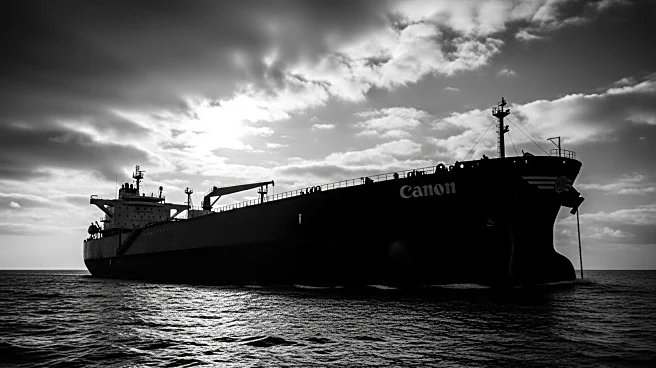What's Happening?
The captain of an oil tanker, allegedly part of Russia's shadow fleet, is set to face trial in France. The tanker, immobilized off France's Atlantic coast, is suspected of being involved in activities to evade Western sanctions against Russia. French President Emmanuel Macron has linked the tanker to Russia's shadow fleet, which consists of aging vessels with uncertain ownership. These ships are believed to be avoiding sanctions imposed due to Russia's war in Ukraine. The captain and chief mate, both Chinese nationals, were detained but later released, with the captain facing charges of refusal to cooperate and failure to justify the vessel's nationality. The trial is scheduled for February, and the captain could face up to one year in prison and a fine of 150,000 euros.
Why It's Important?
This development highlights the ongoing international efforts to enforce sanctions against Russia and disrupt its economic activities related to the war in Ukraine. The shadow fleet is reportedly responsible for financing a significant portion of Russia's war effort, with estimates suggesting it contributes over 30 billion euros. By detaining these vessels, France aims to undermine the business model that supports Russia's military activities. The trial could set a precedent for how countries deal with vessels attempting to circumvent sanctions, potentially leading to increased pressure on Russia's economic capabilities.
What's Next?
The trial of the captain in February will be closely watched as it may influence future actions against similar vessels. France's actions could encourage other countries to take similar measures, increasing the pressure on Russia's shadow fleet. The international community may also explore additional sanctions or enforcement strategies to further limit Russia's ability to finance its war efforts. The outcome of the trial could impact diplomatic relations and the enforcement of international maritime laws.
Beyond the Headlines
The case raises questions about the transparency and accountability of maritime operations, especially concerning vessels with unclear ownership and nationality. It also underscores the challenges in enforcing international sanctions and the need for coordinated global efforts to address such issues. The involvement of nontransparent entities in purchasing these aging tankers highlights the complexities of international trade and the potential for exploitation in circumventing sanctions.









